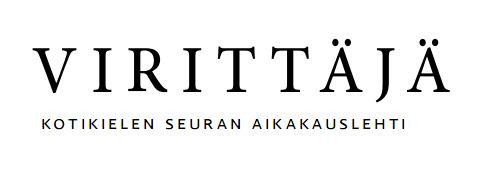Kielitieteen emergenttinen metateoria
Avainsanat:
emergenssi, semiotiikka, sääntö, yleinen kielitiede
Abstrakti
Emergent metatheory on linguistics (englanti)4/2000 (104)
Urho Mtt (skurma@uta.fi)
EMERGENT METATHEORY IN LINGUISTICS
The article provides an overview of emergent metatheory in linguistics (previously known as evolutionary functional linguistics; see Mtt 1994). The viewpoint presented is based on hermeneutic metatheory (Itkonen 1978), Peirces concept of semiosis, emergent materialism (Niiniluoto 1990) and empirical research data on dynamic emergence in neurological development (Elman 1999).
The writer asserts that grammatical description is part of natural language, the ontology of which comprises many levels. Language is moulded by human evolutionary history as well as its own linguistic history. Language is also an expression of the stages of an individuals development. Learning the structure of a language is part of a childs development process, an emergent neurologically, cognitively and socially dynamic process that is not causally derived from the genotype.
Emergence is understood here as being evolutionary, so that the ontology of a language is inseparably bound up with its epistemology, or the process via which the structure of the language is learnt. Language structure is a socio-cultural reality which emerges through learning, use and reflective analysis. The rules of a language (or generally the social norms) are seen as a continuum of rule-likeness, the uppermost level of which is represented by explication of linguistic rules.
In terms of metatheory, it is wrong to look for a tangible equivalent for linguistic description from reality, or from the brain or psychological reality; grammatical description is not, in this sense, an empirical science but an emergent level of the language which affects its use in the community. The writers interpretation of emergence differs from, for example, the view of Paul Hopper (e.g. 1998), in which the emergence of grammar is an indication of the epiphenomenal nature of rules.
Some of the traditional as well as new approaches to linguistics are related to the emergent metatheory presented here, the original aim of which was to analyse the nature of functional explanation and to define the conditions within which it is metatheoretically justified. Besides the functionalism already mentioned, linguistic emergence is found in the semiotic approach emphasising analogy (Anttila 1977, 1989), and in evolutionary cognitivism (see Tomasello 1998; Heine 1997), dialogism (Linell 1998) and child language research (Bates 1999). Emergent metatheory seeks to combine the linguistic emergence and the traditional philosophical problem of social rules. The problem in question concerns the relationship between rule (internal) compliance and external behaviour: on the one hand social reality is constituted by rules, but on the other hand the rules observed cannot be determined directly from external behaviour. According to the solution presented, a language rule (or grammar) is a phenomenon emerging through an evolutionary process.
This conceptual problem for linguistic and scientific philosophy, concerning the relationship between rule definition (emergence ) and behaviour, reflects the real-time existence of human language: language is an evolutionary, time-bound process that involves abstraction of rules from behaviour. These rule abstractions in turn affect (under the concept of emergence) behaviour, but certainly do not causally determine it or intentionally control it. Rules direct behaviour specifically in this emergent and evolutionary sense. If the phenomenon is abstracted into time-based historicism, this would lead to a conceptual impasse on the ontological question.
Viittaaminen
Määttä, U. (2000). Kielitieteen emergenttinen metateoria. Virittäjä, 104(4), 498. Noudettu osoitteesta https://journal.fi/virittaja/article/view/40040





